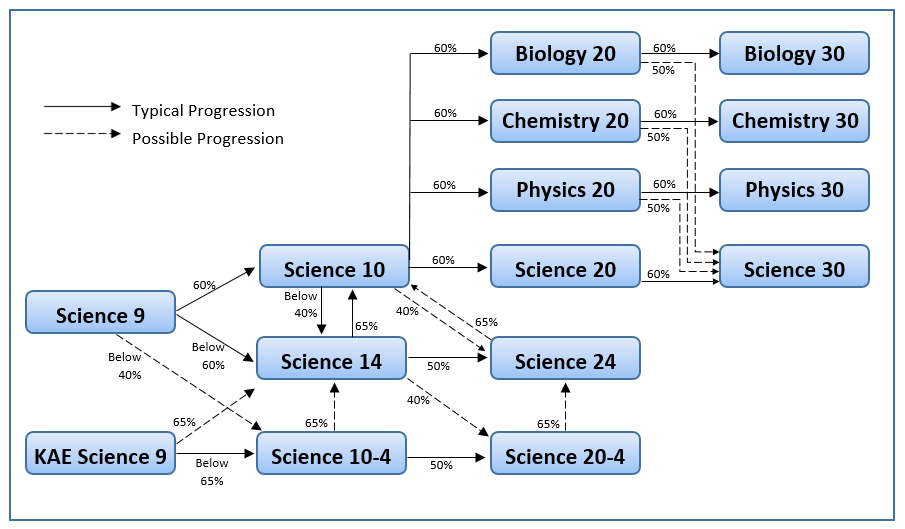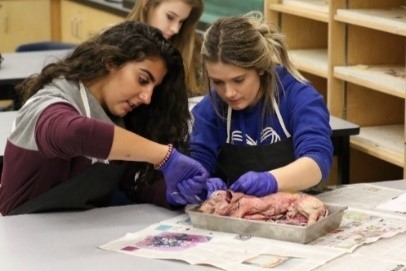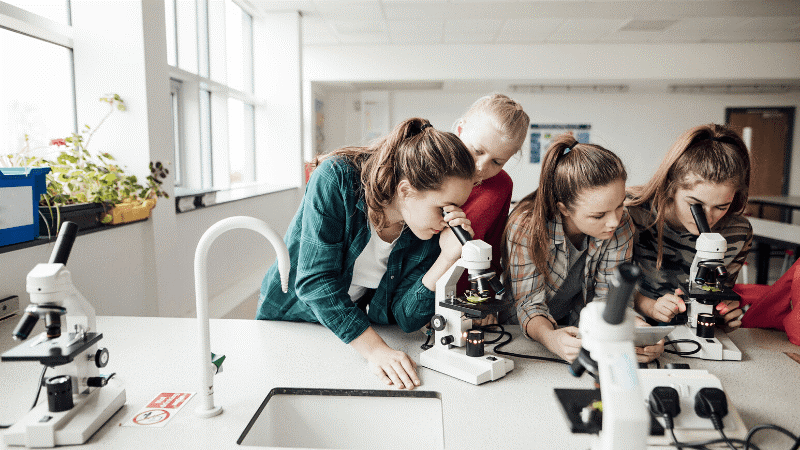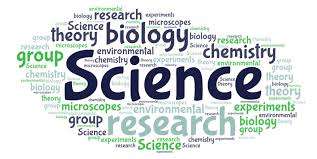Science
The high school Science program is designed to assist you in gaining the scientific understanding necessary to be an effective member of society. Learning opportunities are made meaningful so that students can relate science to their lives both inside and outside of the classroom.
The Science program consists of many courses, and students have several choices based on their interests, abilities, and future plans. Science courses provide you with facts, principles and concepts to give you a better understanding of the world around you. After Science 10, you can choose to take Science, Biology, Chemistry or Physics depending on your interests, abilities and future goals. Students need to complete at least one Science course at the 20 level in order to obtain a high school diploma.
Science/Sciences 10 (5 credits)
Recommended Prerequisite: 60% in Science 9 recommended and registration in Math 10C
Recommended French Immersion prerequisite: 60% in Sciences 9 and registration in FLA 10
Science 10 is an academic course with biology, chemistry, physics and climate change units. This is the foundation for progression through all science courses at the 20 and 30 levels.
Science/Sciences 14 (5 credits)
Recommended Prerequisite: Less than 60% in Science 9
Recommended French Immersion prerequisite: Less than 60% in Sciences 9 and registration in FLA 10
Non-academic, activity-based modules covering basic biological, chemical and physical principles. Science 14 is an exciting, hands-on exploration of the world around us. The focus of this course will be the hands-on application of the science discussed in class. To that end, the content of this course will consist heavily of note packages for students to follow along and utilize for study, labs and summative assessments in the form of chapter tests and a final exam.
Science/Sciences 20 (5 credits)
Recommended Prerequisite: 60% in both Science 10 and Math 10C
Recommended French Immersion prerequisite: 60% in Sciences 10 (FI) AND completion of FLA 10
Science 20 is a challenging multi-disciplinary course that consists of four units of study: chemical changes (chemistry), changes in motion (physics), the changing Earth (Earth sciences) and changes in living systems (biology).
Science 24 (5 credits)
Recommended Prerequisite: 50% in Science 14 or 40% (or greater) in Science 10
Non-academic, activity-based modules covering basic biological, chemical and physical principles. Diverse learning experiences within the Science 24 program provide students with opportunities to explore, analyze and appreciate the interrelationships among science, technology, society and the environment, and to develop understandings that will affect their personal lives, their careers and their futures.
Biology/Biologie 20 (5 credits)
Recommended Prerequisite: 60% in Science 10
Recommended French Immersion prerequisite: 60% in Sciences 10 FI and completion of FLA 10
Biology 20 is an introductory study of living systems. Topics include energy and matter exchange in the biosphere, ecosystems and population change, photosynthesis and cellular respiration and five human systems (digestive, excretory, respiratory, motor and circulatory systems).
Chemistry/Chimie 20 (5 credits)
Recommended Prerequisite: 60% in Science 10 AND Math 10 C
Recommended French Immersion prerequisite: 60% in Sciences 10 FI AND Math 10C AND completion of FLA 10
Chemistry 20 is an introductory course with a focus on the study of chemical bonding, solutions, acids and bases, gaseous systems, and quantitative relationships in chemical reactions. Emphasis is placed on the scientific process.
Physics/Physique 20 (5 credits)
Recommended Prerequisite: 60% in Science 10 AND Math 10 C
Recommended French Immersion prerequisite: 60% in Sciences 10 FI AND Math 10C AND completion of FLA 10
Physics 20 is an academic course that investigates the motion of objects and explains why they move. In addition to expanding the content covered in Science 10, students will develop and utilize vector notation, net force equations, circular motion, field theory and mechanical waves. Physics 20 requires a strong math background as concepts are developed with corresponding equations that are used to solve problems.
Science/Sciences 30 (5 credits)
Recommended Prerequisite: 60% in Science 20 or 50% in Biology, Chemistry or Physics 20 AND 60% in Math 20-1 or Math 20-2
Recommended French Immersion prerequisite: 60% in Sciences 20 (FI) or 50% in Biologie, Chimie or Physique 20 AND 60% in Math 20-1 or Math 20-2 AND completion of FLA 20
Science 30 is an academic multi-disciplinary science covering topics in biology (circulatory system and genetics), environmental chemistry pollutants and organic chemistry), physics (electricity and astronomy) and energy production technologies.Science 30 can be counted as a 30-level science for many post-secondary programs.
This is a diploma course - students will write a government exam worth 30% of final their mark.
Biology/Biologie 30 (5 credits)
Recommended Prerequisite: 60% in Biology 20
Recommended French Immersion prerequisite: 60% in Biologie 20 (FI) AND completion of FLA 20
Biology 30 is an academic course with continued in-depth study of physiological systems (nervous, endocrine and reproductive systems), genetics and population ecology.
This is a diploma course - students will write a government exam worth 30% of their final mark.
*Please Note: Biologie 30 (French Immersion) will not be offered for the 2026-2027 school year.
Chemistry/Chimie 30 (5 credits)
Recommended Prerequisite: 60% in both Chemistry 20 AND Math 20-1
Recommended French Immersion prerequisite: 60% in Chimie 20 (FI), Math 20-1 AND completion of FLA 20
Chemistry 30 is an academic course with a focus on organic chemistry, thermochemical changes, electrochemistry and equilibrium of acid and base systems. Scientific and technological knowledge is integrated with societal issues and there is an emphasis on communication skills.
This is a diploma course - students will write a government exam worth 30% of their final mark.
*Please Note: Chimie 30 (French Immersion) WILL be offered for the 2026-2027 school year.
Physics 30 (5 credits)
Recommended Prerequisite: 60% in both Physics 20 and Math 20-1
Physics 30 is an academic course that investigates the fundamental forces of the universe. The concepts of vector notation, net force, circular motion and energy from the physics 20 course are applied to the concepts of momentum, electricity and magnetism. This course also develops the concepts of electromagnetic radiation, nuclear reactions and particle physics. Physics 30 requires a strong math background as concepts are developed with corresponding equations that are used to solve problems.
This is a diploma course - students will write a government exam worth 30% of their final mark.
Knowledge & Employability Sciences
Knowledge and Employability Science provides basic science literacy and promotes awareness, understanding and the development and application of science skills, knowledge and attitudes for successful living at home, in the workplace and the community.
Students who are successful in Science 10-4 or 20-4 and wish to upgrade to Science 14/24 may do so with the appropriate mark. Please refer to the Course Sequencing chart on the previous page for guidelines.
Science 10-4 (5 credits)
Less than 40% in Science 9- recommended
The key concepts covered Science 10-4 are Investigating Properties of Matter; Understanding Energy Transfer Technologies; Investigating Matter and Energy in Living Systems; and Investigating Matter and Energy in Environmental Systems.
Science 20-4 (5 credits)
The key concepts covered in Science 20-4 are Applications of Matter and Chemical Change; Understanding Common Energy Conversion Systems; Disease Defense and Human Health; and Motion, Change and Transportation Safety.





